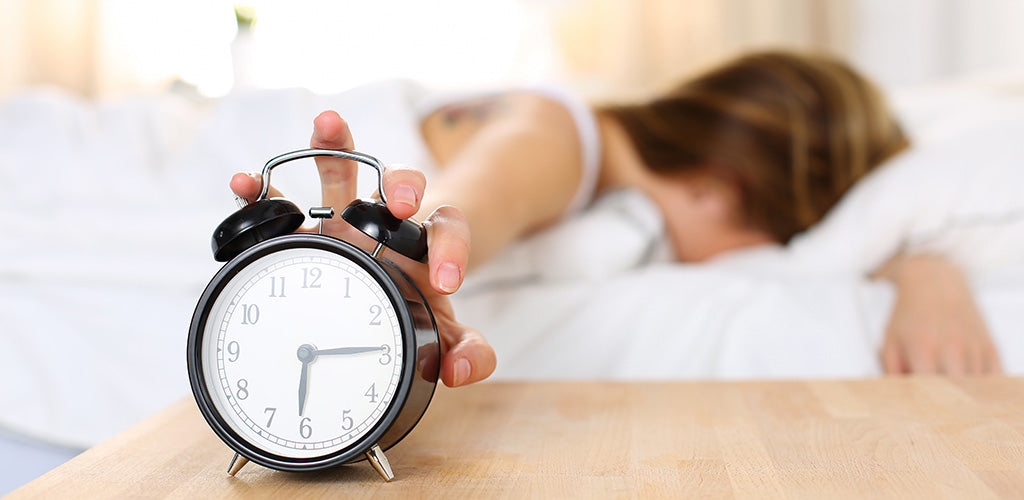
The 6 best sleep tips for the time change
Every year we face the challenge of the time change—whether it's the switch to daylight saving time or the return to standard time. For many, this means not only a change in the time, but also an adjustment to our sleep rhythm. The time change can throw the body off sync and cause sleep problems. But don't worry—with the right sleep tips, the transition can be made much easier. In this article, you'll learn everything you need to know about the effects of the time change on our sleep and how you can better prepare for it.
Table of contents
- The change to summer or winter time
- Our internal clock
- 6 sleep tips for the time change
- Babies and toddlers: How to cope with the time change
- Conclusion
1. The change to summer or winter time
Every year, the question arises as to why we change the clocks at all. Daylight saving time was originally introduced to make better use of daylight and save energy. It has been practiced in many countries since 1980. The clocks change twice a year: in spring, the clocks are turned forward one hour, and in autumn, they go back.
But although the time change seemed sensible when it was introduced, there are now many critics. Studies have shown that the change to daylight saving time disrupts sleep, impairs well-being, and can even lead to an increase in health problems. This is due to the effects of the time change on our Sleep-wake rhythm due to.
2. Our internal clock
Every person has an inner biological clock, which controls our sleep-wake cycle. This so-called "circadian rhythm" is influenced by external stimuli such as daylight and causes us to feel awake during the day and tired at night. But what happens when this internal clock is disrupted – perhaps due to time changes?
The circadian rhythm is determined by the interaction of hormones such as Serotonin and Melatonin Serotonin ensures alertness and a good mood during the day, while melatonin is produced at night and helps us fall asleep. When the time change suddenly dictates a different rhythm, the body may have difficulty processing these changes.

Especially the change to summer time can lead to a “jet lag"-like condition, as the body cannot immediately cope with the new time. A sudden loss of sleep can also disrupt the hormonal balance, which can lead to Discontent and reduced performance.
3. Sleep tips for the time change
To ensure that the time change doesn't lead to a sleepless night, there are several tips you can use to prepare for the change:
#1: Adjust bedtime early
If you prepare for the time change in advance, it will be easier for your body to adjust. Set your bedtime about 15 to 30 minutes earlier, perhaps a week before the time change. This gives your body enough time to gradually adjust to the new rhythm.
#2: No heavy meals before bedtime
Eat light meals in the evening to give your body the Fall asleep It is best to choose foods that are Melatonin suppliers and promote natural sleepiness. Heavy meals or fatty foods should be avoided at least 2–3 hours before bedtime.This way, your digestive system isn't unnecessarily stressed, and your body can relax better. You can find more nutritional tips for better sleep here.
#3: Use daylight and fresh air
Daylight is the body's most important signal for maintaining the circadian rhythm. Take advantage of sunny days to spend time outdoors. Movement in the fresh air promotes the production of serotonin and helps you feel awake and active during the day.

#4: Avoid naps
Although a nap While it may be tempting, it can be counterproductive, especially during the time change. A nap can disrupt your natural sleep-wake cycle and make it difficult to fall asleep at night. Try to avoid napping, especially in the days leading up to the time change.
#5: No screen use in the evening
The blue light of
#6: Use relaxation techniques
To calm down more quickly, you can also Relaxation techniques like meditation, breathing exercises, or Muscle relaxation These practices promote the production of melatonin and ensure better sleep quality.
4. Babies and toddlers: How to successfully adjust to the time change
Not only adults, also Babies and Toddlers are struggling with the time change. Young children don't yet have a stable sleep-wake rhythm, which is why they are particularly sensitive to changes. To make the transition as smooth as possible for your child, you can follow these tips:
- Slow adaptation: Gradually shift your baby or toddler's bedtime by changing the bedtime by 10-15 minutes each day.
- Introduce a fixed sleep routine: Stick to a regular routine at bedtime to give the child security. A familiar routine helps ease the transition to the new time.
- Use the morning sun: Make sure your child gets plenty of daylight after waking up. This will help them establish the new routine more quickly.
- Have patience: Babies and toddlers often need a few days to adjust to the new routine. Give yourself and your child time.
5. Conclusion:
- The time change affects the sleep-wake cycle, disrupts the circadian rhythm and can lead to sleep problems and health problems.
- The circadian rhythm is regulated by the hormones serotonin and melatonin. The change can disrupt these hormones, leading to Sleep disorders and reduced performance.
- A gradual adjustment of bedtime, avoiding heavy meals before bedtime and regular use of daylight make the transition easier.
- Screen use before bedtime, naps, and irregular sleeping habits should be avoided to avoid further disrupting the sleep-wake rhythm.
- A gradual adjustment of bedtime, fixed sleep routines and plenty of morning sun help children adjust to the time change.
With these simple tips, you can survive the time change stress-free and also get your sleep-wake rhythm back on track. This way, you'll quickly get back to restful sleep after the time change and start the new day feeling refreshed and rested!


Leave a comment
This site is protected by hCaptcha and the hCaptcha Privacy Policy and Terms of Service apply.